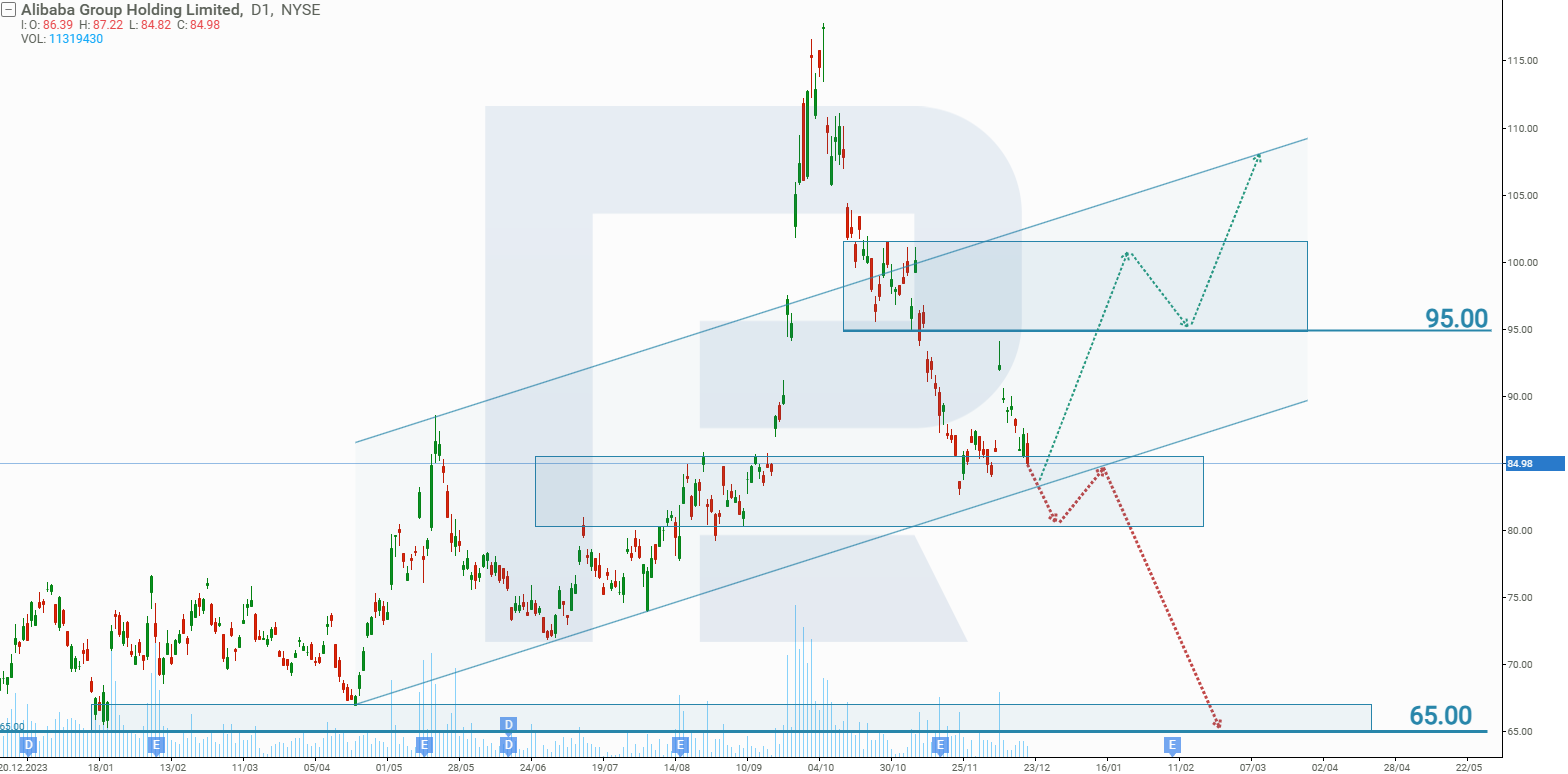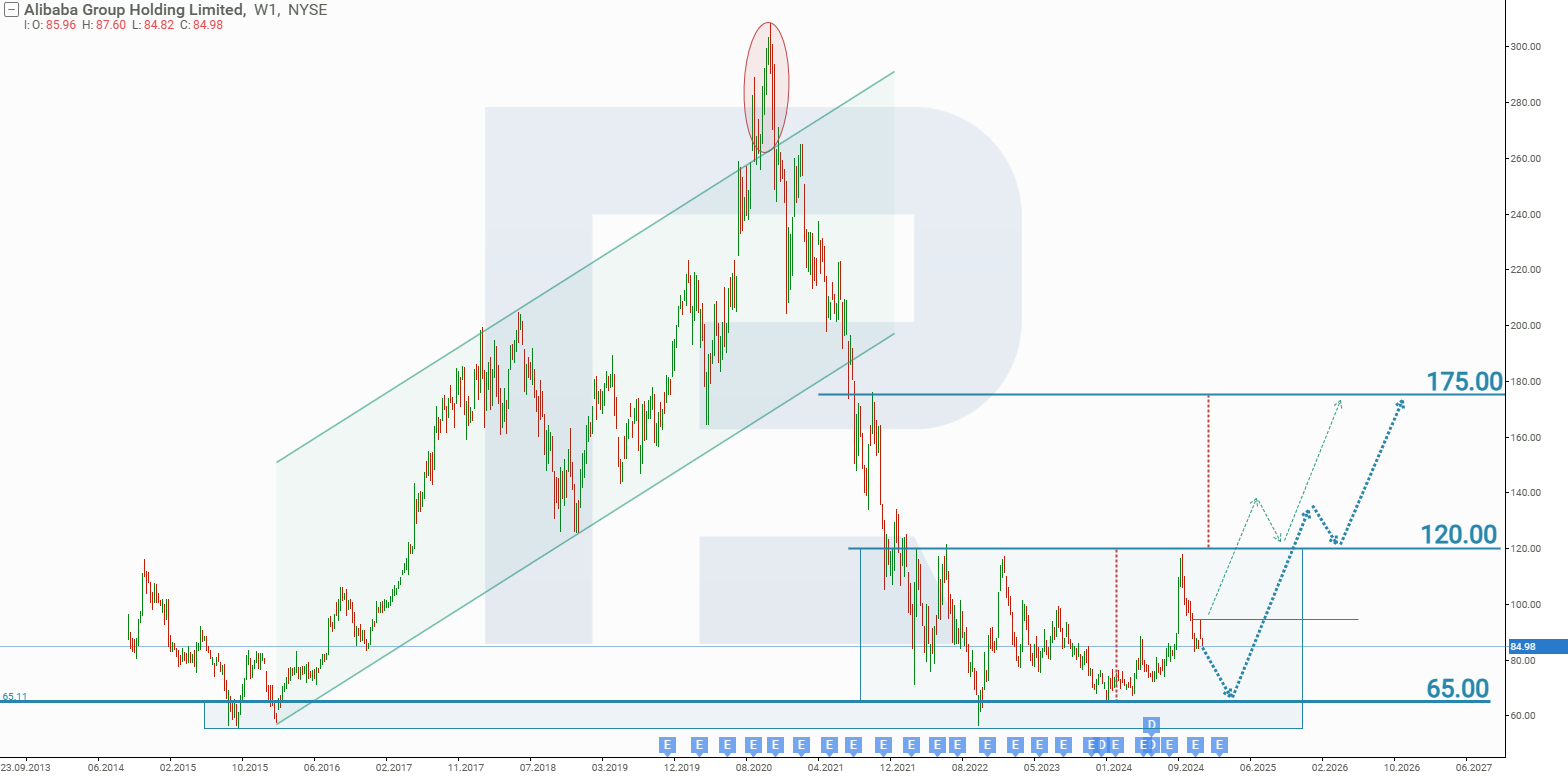Forecast for Alibaba shares: growth expected in 2025
The era of stringent regulatory pressure from the Chinese government on Alibaba is over. In 2024, Chinese authorities’ rhetoric towards business shifted, and the government is now seeking ways to provide support. The mere news of China’s economic stimulus increased Alibaba’s shares by 10.0%. It may now be the right time to consider investing in these stocks.
This article provides an overview of Alibaba Group Holding Ltd, detailing the company’s main revenue sources. It also provides a fundamental analysis of Alibaba Group’s (BABA) report and a technical analysis of Alibaba Group’s shares, which form the basis for the forecast for Alibaba’s stock in January and throughout 2025.
About Alibaba Group Holding Ltd
Alibaba Group Holding Ltd is the largest Chinese technology company. Founded in 1999 in Hangzhou by Jack Ma (also known as Ma Yun) and his team, the company operates in e-commerce, cloud computing, financial technologies, logistics, and the media and entertainment sectors. Its platforms (AliExpress, Taobao, and Tmall) connect millions of buyers and sellers worldwide. Alibaba is also actively advancing Artificial Intelligence (AI) and innovative technologies, playing a pivotal role in the global digital economy.
Alibaba’s initial public offering (IPO), which raised USD 25.0 billion, took place on 19 September 2014 on the New York Stock Exchange under the ticker symbol BABA. At the time, it was the largest IPO in history.
Alibaba Group Holding Ltd’s main financial flows
Alibaba Group’s revenue streams are divided into the following key areas:
- E-commerce: revenues from Alibaba.com, AliExpress, Lazada, Taobao, and Tmall platforms, as well as commissions from sales, advertising services, and subscriptions
- Cloud computing: revenue from Alibaba Cloud for providing cloud solutions, including data storage, AI-based products, analytical forecasts, and corporate technologies
- Logistics: financial proceeds from the services of Cainiao Network, a logistics platform that facilitates domestic and international deliveries
- Media and entertainment: revenue from digital services, such as the streaming platform Youku, film production, content creation, and advertising
- Financial technology: through its partnership with Ant Group, Alibaba generates revenue from providing financial and payment services
- Other services: this includes revenues from Alibaba Health, Lingxi Games, Freshippo, Intime, Sun Art, intellectual information platforms, Fliggy, DingTalk, and other company divisions. Revenue in this segment is mainly derived from direct sales
The main contributor to the financial flow is the e-commerce segment, particularly domestic operations in the Chinese market.
Alibaba Group Holding Ltd’s Q2 2024 report
On 15 November 2024, Alibaba Group Holding Ltd released its Q2 2024 report, which ended on 30 September. The key figures from the report are outlined below:
- Revenue: 33.70 billion USD (+5%)
- Net income: 5.20 billion USD (-9%)
- Earnings per share: 2.15 USD (-4%)
Revenue by segment:
- Taobao and Tmall Group: 14.10 billion USD (+1%)
- Cloud Intelligence Group: 4.22 billion USD (+7%)
- International Digital Commerce Group: 4.51 billion USD (+29%)
- Cainiao Smart Logistics Network: 3.51 billion USD (+8%)
- Local Services Group: 2.52 billion USD (+14%)
- Digital Media and Entertainment Group: 0.81 billion USD (-1%)
- All others: 7.43 billion USD (+9%)
In a commentary to the report, CEO Eddie Wu noted strong revenue growth from cloud solutions and AI products. He also cited strategic agreements with key partners to improve payment and logistics services on the Taobao and Tmall platforms.
The company attributes the decline in net profit for the September quarter to significant investments in Alibaba Cloud and refunds to merchants following the cancellation of the annual service fee. Alibaba also rewarded its shareholders with a stock buyback worth 4.1 billion USD.
China announces economic stimulus measures
In early December 2024, the Chinese government announced a series of measures to stimulate the economy. In 2025, it plans to transition to a moderately accommodative monetary policy, including interest rate cuts and increased liquidity to support growth. The budget deficit for next year is projected to reach a record 4% of GDP, which will allow for increased government spending. The quota for special-purpose bonds is also expected to be expanded to finance infrastructure projects. The People’s Bank of China will allocate funds to support liquidity in the stock market, aimed at stabilising the financial system.
The Chinese government’s decision to implement additional economic stimulus measures in December 2024 triggered a positive reaction in the stock markets. The Hang Seng index (TVC: HSI), previously down 0.9%, closed the session with a 2.8% gain.
Alibaba’s stock also responded to the news with growth. From 5 to 9 December, the company’s stock rose by 10.0% in the US market, reaching 94.22 USD.
By developing incentives, the Chinese government proactively prepares for the trade tariffs that Donald Trump may impose after his inauguration. Market participants reacted positively to the news initially, but the excitement quickly subsided, and the quotes returned to their previous levels. Evidently, investors are unwilling to take risks and await tangible actions to stimulate the economy. For now, it remains merely a matter of statements.
Alibaba is China’s most prominent public company, and as such, its stock is susceptible to government statements and actions. Consequently, if the stimulus program is launched and funds are injected into the economy, Alibaba’s stock may rise.
Expert forecasts for Alibaba Group Holding Ltd’s stock for 2025
- Barchart: 17 out of 19 analysts rated Alibaba Group’s stock as a Strong Buy, while two assigned a Hold rating, with an average price target of 119.89 USD
- MarketBeat: 13 out of 15 specialists issued a Buy rating for the shares, while two gave a Hold rating, with an average price target of 114.07 USD
- TipRanks: 14 out of 15 analysts assigned a Buy rating to the stock, while one gave a Hold recommendation, with an average price target of 127.05 USD
- Stock Analysis: of 15 experts, seven rated the stock as a Strong Buy, six as a Buy, and two as Hold, with an average price target of 111.86 USD
Alibaba Group Holding Ltd’s stock price forecast for January 2025
On the daily timeframe, following a sharp increase in early December, Alibaba’s stock price returned to its previous levels and is approaching the ascending trend line. Given that the financial support or economic measures being discussed will not take effect until 2025, the likelihood of investors actively purchasing the company’s shares at this stage is low. Two potential scenarios can arise in January 2025 based on the current situation.
The optimistic forecast for Alibaba Group’s stock suggests that the price will rebound from the trendline and rise to the 95 USD resistance level. A breakout above this level may drive further stock growth to the channel line at 110 USD. This scenario could be supported by the pre-New Year holidays, during which the e-commerce segment traditionally sees a substantial influx of income. However, this stock growth could be speculative and end with a price decline as market participants lock in profits.
The pessimistic forecast for Alibaba Group’s stock predicts a breakout of the trendline followed by a price decline to the 65 USD support level. This is the more likely scenario, as investors’ recent actions show a lack of confidence in the effectiveness of the planned stimulus for the Chinese economy, and they are not yet prepared to buy Alibaba’s stock.
Alibaba Group Holding Ltd’s stock analysis and forecast for January 2025Alibaba Group Holding Ltd’s stock price forecast for 2025
The weekly timeframe clearly illustrates the consequences of the Chinese government’s regulatory pressure on Alibaba Group, which began with the suspension of Ant Group’s IPO in November 2020. As a result, from November 2020 to October 2022, Alibaba stock lost 82%, falling to levels last seen in 2015. Since March 2022, the stock has been trading between 65 USD and 120 USD. In October 2024, the share price approached the upper boundary of this range again but failed to break through and reversed direction. Based on Alibaba Group’s current stock performance, two potential scenarios for the coming year are possible.
The primary forecast for Alibaba shares suggests that the price will test the lower boundary of the range at 65 USD, rebound, and rise to the 120 USD resistance level. Given that the Chinese government plans to implement stimulus measures in 2025, Alibaba Group’s shares could break through the upper boundary of the range and continue their upward trajectory, reaching the 175 USD level.
The optimistic forecast for Alibaba’s stock suggests price growth from the current resistance levels to 120 USD. As mentioned above, this could be driven by expectations of impressive financial results at the end of the quarter amid pre-New Year sales. If the stock price breaks the 120 USD resistance level, it could rise further and reach 175 USD.
Alibaba Group Holding Ltd’s stock analysis and forecast for 2025Risks of investing in Alibaba Group Holding Ltd stock
Investing in Alibaba Group may involve several risks, which could be particularly significant amid China’s economic measures and policies. The main risks are listed below:
- Connection with the economic stimulus: if the Chinese government cancels or inadequately stimulates the economy, this could negatively impact Alibaba’s shares
- Global economic conditions: like many large tech companies, Alibaba relies heavily on global markets. For example, economic instability, trade wars, or a decline in global demand could exert pressure on the company’s earnings
- Trade risks: like other Chinese companies, Alibaba faces the risk of trade sanctions from the US. In particular, restrictions on Chinese companies’ access to Western markets, including US-based platforms, could hinder business expansion and reduce profitability
- Regulatory and political risks: like other Chinese tech companies, Alibaba operates under strict control by Chinese authorities. In recent years, the Chinese government has tightened regulations in the technology and internet sectors, which has led to a significant decline in Alibaba’s market capitalisation. The company is also actively expanding its financial services through its subsidiary, Ant Group, which offers lending, mobile payments, and other services. However, the Chinese government has already imposed restrictions on Ant Group’s growth, negatively impacting the company’s stock. At this stage, the realisation of regulatory risks is unlikely, as the Chinese government is implementing measures to stimulate the economy and is unlikely to complicate business operations in the current climate
Summary
Alibaba’s IPO took place in September 2014, with its first trading session starting at 89.50 USD. Since then, the company’s revenue has surged by 1,200%, yet its share price remains below its initial IPO price. The Chinese government’s regulatory pressure has significantly impacted the share price, and Alibaba shares may now be oversold.
Both optimistic and pessimistic forecasts for Alibaba’s stock in 2025 suggest an increase in value. The only question is whether this will occur from the current or the support level at 65 USD. This factor is of limited significance for long-term investors who follow risk management principles.
If the Chinese government proceeds with its planned injection of financial resources into the economy, it could be a strong driver of Alibaba’s share price growth in 2025.




